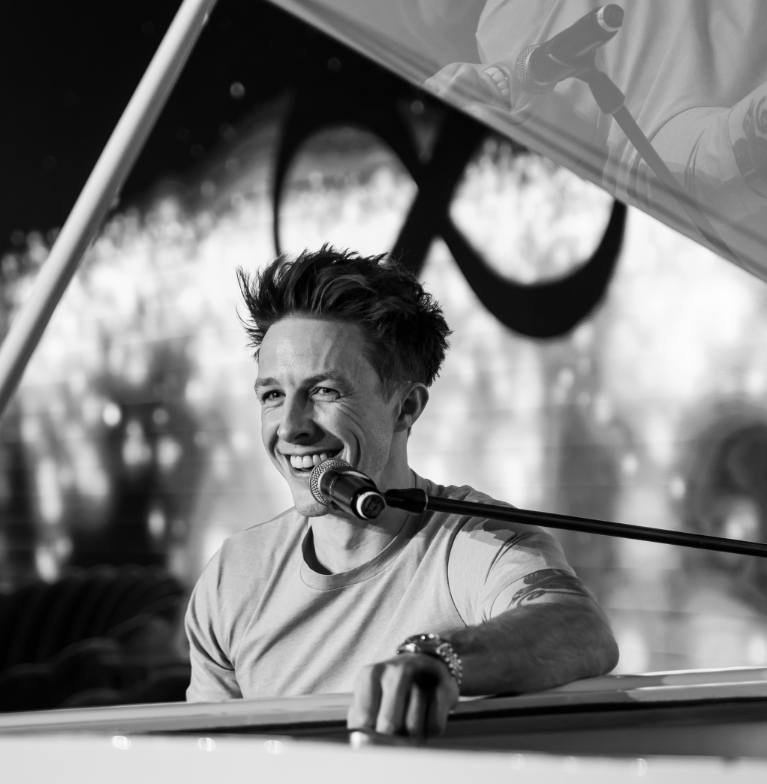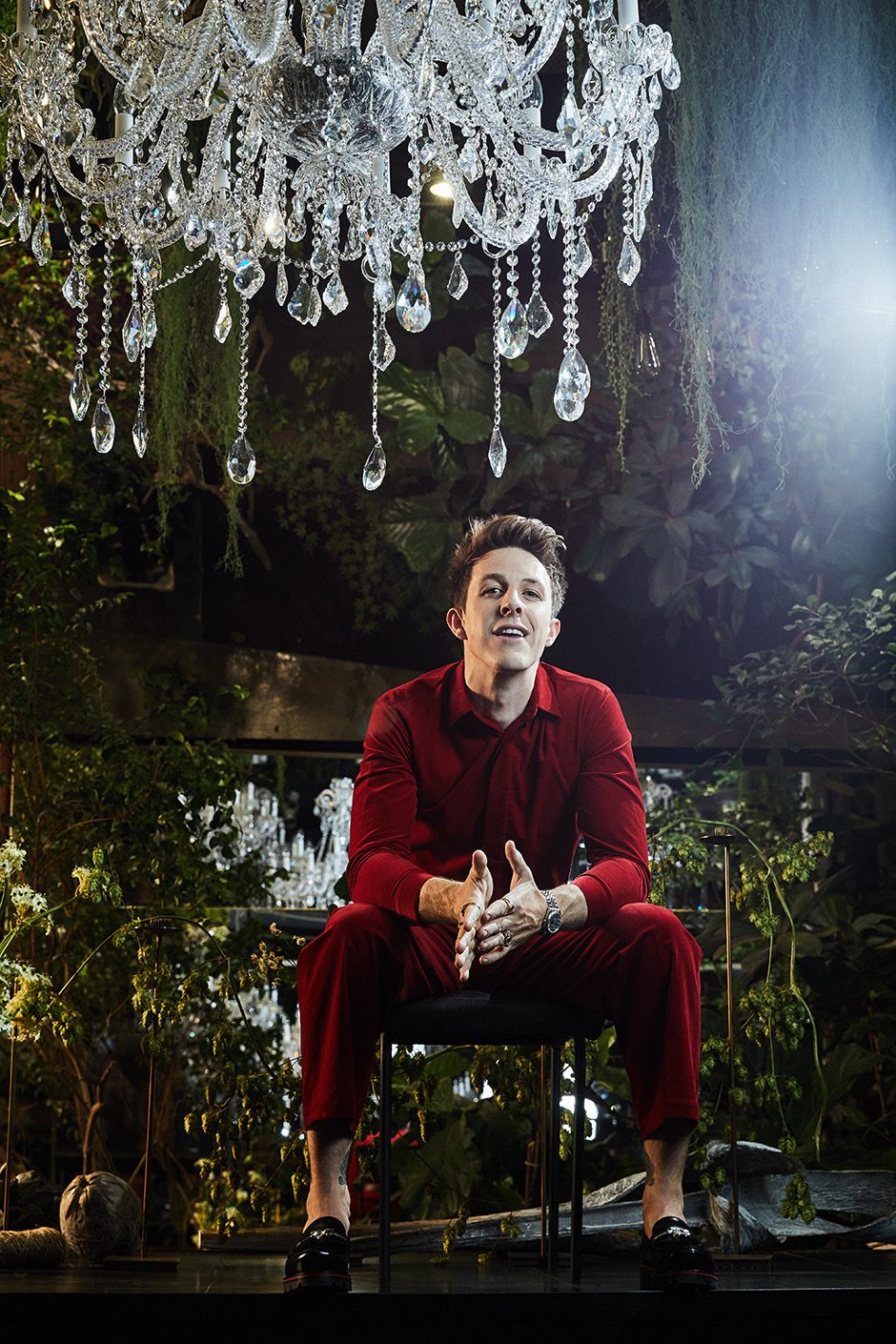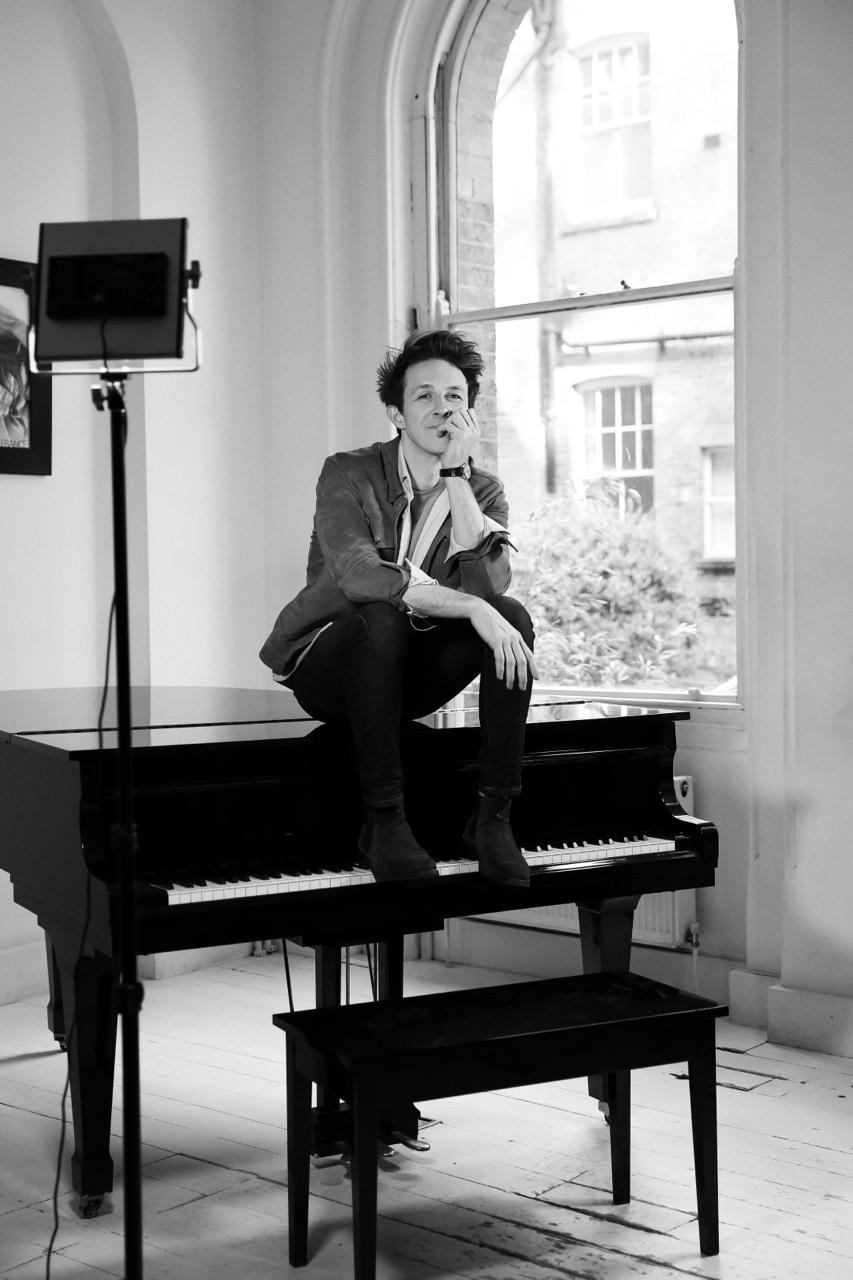No products in the cart.
Stephen Ridley: Pianist Living The Ethereal Musical Dream

The Maestro Behind the Music
Stephen Ridley is more than just a world-renowned pianist; he is a visionary artist dedicated to redefining music education. With a career that has captivated global audiences, Ridley’s passion extends beyond the stage to the classroom, where he inspires the next generation of musicians through the Ridley Academy. His journey from street performer to international sensation is a testament to his talent, perseverance, and unwavering belief in the power of music. Through Ridley Academy, he is revolutionizing traditional methods of learning, proving that true artistry comes from passion, discipline, and fearless creativity. He is a gifted world-class pianist, composer, singer, and entrepreneur known for his electrifying performances and fearless approach to life and music.
From playing on the streets to performing on the world’s biggest stages, Stephen’s journey is one of passion, risk-taking, and relentless self-belief. Today, we dive into his inspiring story, his music, and the philosophy that fuels his success.
LISTEN TO THE FULL PODCAST EPISODE HERE
A Fearless Approach to Life and Music
Stephen Ridley’s journey is not just about musical mastery; it is about resilience, purpose, and the deep connection between artistry and faith. For him, music is more than just notes on a page—it is a universal healer, a force that transcends barriers, and a divine gift that can transform lives. His passion for music is rooted in a belief that true artistic expression is a form of worship, a way to channel something greater than oneself into the world.
This understanding was not just born from his experiences as a musician, but from a pivotal moment in his life—the passing of his father. Holding his father in his final moments, Ridley witnessed firsthand the fragility of life and the urgency of making the most of every moment. “It left such a vacuum,” he recalls, “and it put my own fears into perspective. Nothing seemed as scary anymore.” From that moment on, Ridley made a promise to himself—to live without hesitation, without fear, and without wasting the gift of time.
Turning Pain Into Purpose
Ridley’s fearlessness is not a reckless abandonment of caution, but rather a deep-rooted commitment to living authentically. He refuses to let self-doubt, societal expectations, or fear of failure dictate his path. “I don’t think I’m the most anything,” he admits. “But who cares? I have a shot to contribute, to be of service, to leave a little beautiful stain where I once was.”
This perspective has shaped not only his music but also his mission with Ridley Academy. He wants to inspire others to embrace their gifts, step into their calling, and create fearlessly. For him, artistry is not about perfection but about truth—expressing something real, something raw, something that has the power to move and heal. His performances are an odd to the very experience of being alive, and feeling the richness of the power in every musical moment.
He refuses to waste time or talent, knowing that every second counts. “I can’t stay in bed too long,” he says. “It drives me to action. And action always drives integrity.” This relentless drive is what has propelled him to global recognition, but more importantly, it has allowed him to make an impact—not just as a pianist, but as a mentor, a leader, and a force for positive change in a world shrouded in darkness, where his light shines brightly reflecting the glory of God.
Beverly Hills Magazine: Great hair. I love it.
Stephen Ridley: I’m not going to lie. I got it cut today. I woke up looking like a bag of nails. And I thought, okay, let me shape up. So I’m so excited to spend some time with you today.
Beverly Hills Magazine: Thank you for being on the show.
Stephen Ridley: Me too, genuinely.
Beverly Hills Magazine: Welcome.
Stephen Ridley: Thank you for having me. Of course. I watched the one you did with Grant, and I absolutely loved it. I’m so thrilled and feel really, really grateful to be with you. I love the questions you ask, and you seem to bring out the best in people, which obviously shows who you are.
Beverly Hills Magazine: Oh, that’s sweet. Thanks. I appreciate that, and I hope so. So let’s bring out the best in you today.
Stephen Ridley: I’m here for it.
Beverly Hills Magazine: Awesome. So why don’t you take us back to the beginning? When did your journey with music start?
Stephen Ridley: Yeah, well, I come from a little village. There are 40 people in the village I come from. No musicians.
Beverly Hills Magazine: Wow.
Stephen Ridley: Yeah. But my dad loved music. My dad was quite an aggressive guy, very stern, very strict. Except when you played Meatloaf—he became Meatloaf. When he played Elvis, he became Elvis. He became this beautiful, beautiful guy, and I would see this power of music, and I was like, wow. I felt it myself, and I thought, whatever that is, I want that in my life. So I started playing at around three years old, stumbling on a neighbor’s piano, and then it kind of grew from there.
Eventually, I had lessons. I hated it. I found them difficult and boring and overwhelming, and it convinced me that I was no good at music, so much so that I gave up on it. And then my dad died, and it was really the first time in my life that I needed that musical therapy, the spiritual power of music, the healing power of music. So I came back to music—not to pass exams or to get an A, but just to connect to that higher place that it can take me to. And it did. I built a completely new relationship with music, and I’ve been riding that relationship ever since. It’s just changed my life.
The more I’ve leaned into it, the more it’s changed my life. It’s allowed me to go around the world, meet millions of people, and touch millions of lives. It’s an amazing thing.

Beverly Hills Magazine: Absolutely. Music was created to heal the soul, and you have connected with it on such a deep emotional and spiritual level. You’re sharing that with the world, and it’s impacting hearts worldwide. So you started playing out on the streets… What did that experience teach you about music, people, and the world around you?
Stephen Ridley: I’ll tell you, the craziest thing was not just playing in the street. Before that, I was working in the top team of the top investment bank on the planet. Coming from a village, working hard through university, I never believed I could be an artist. It was just something I did for my own soul food. But when my dad died, we had no money, and all I could think about was, I need money. Money will make me happy. And then I got this job in a bank, utterly motivated by money—the only reason anybody works in a bank, right? And I was miserable.
The lesson my father taught me when he died was that life is short. “One day” doesn’t work. You know, one day I’ll do this, one day I’ll do that. I saw that I was starting to make the mistake that I’d seen him make, so I quit that job.
I didn’t necessarily plan on playing piano in the street. I just had a dream. I knew it was stupid. I was nervous to tell people. I didn’t imagine I would do it for more than a couple of weeks. I just needed to feel something. And that was the scariest possible thing I could think of. I was terrifically introverted, and I loved music so much that the idea of sucking at it was debilitating.
I was walking down the street and saw a piano in a little thrift shop on Brick Lane in London. I was in such a state of shock from quitting my career and life, with no idea what to do next. I thought, I want that healing power again. I sat down at the piano, and the grumpy guy in the shop told me, “If you want to play that piano, you’ve got to buy it.” It was 100 pounds—the best 100 pounds I ever spent. I bought it, and then I thought, now what do I do? He helped me drag it into the street in front of the shop. I figured, well, I guess I’ll just play it here. And that’s how I started playing in the street.
Beverly Hills Magazine: That is so cool. And you made such a good point. So many people make money their god, chasing dollars but sacrificing their dream, their natural, God-given talent that has the power to transform not only themselves but the world. That’s why I always advocate pursuing your dreams. Your dreams were put in your heart by God for a reason. Even if circumstances around you seem impossible, you’ve got to go for it.
Stephen Ridley: 100%. And circumstances only seem impossible because you haven’t gone in that direction yet. If you look at a kid learning to walk, at first they look ridiculous. But they keep trying, and eventually, they walk. That perseverance is in everyone.
When I worked in the bank, I didn’t look stupid because I had spent years getting there. But when I started playing piano in the street, the people I worked with used to walk past me, take pictures, and email them around the office like, “Ha ha, look at this guy. Now he’s a beggar in the streets.” I got ridiculed. Everyone in my life dropped me. I thought, maybe I’ve lost my mind.
But I felt alive. I had never felt alive before then. I was just scared before. Now I was doing something that felt right. It felt real. I could sense every emotion, every day. It was terrifying and exhilarating. And I loved it.
Beverly Hills Magazine: Your performances are known for being raw and full of energy. How do you channel such emotion into your music? Is it something conscious or is it natural?
Stephen Ridley: That came from playing in the street. At first, I played hoping people would like me, but that didn’t work. After enough rejection, I stopped caring. I reached a place of complete honesty—just playing because I love it. And the moment I did that, everyone stopped to listen.
Beverly Hills Magazine: Amazing. So, what has been the most memorable performance of your career so far?
Stephen Ridley: It was in Uzbekistan. I played there, and honestly, I didn’t even know where Uzbekistan was on a map.
Beverly Hills Magazine: I know! Have you figured it out now?
Stephen Ridley: Yeah, I have Googled it now, so I can say it’s a very landlocked country near Russia in the Middle East. But at the time, I knew nothing about it. Then, out of nowhere, I received this ominous email saying, “Hey, we want you to come here and play in a venue.”
They told me the venue was for 1,500 people and that they would pay me for a full venue in advance, then promote the tickets. That doesn’t normally happen. Usually, you have to sell the tickets first and then get paid afterward. It felt kind of weird.
I thought, “I don’t think anyone in Uzbekistan is going to come to see me because, well, they definitely don’t know me.” But I said yes. I always love a good experience. Even if it went wrong, it would make for a great story.
Beverly Hills Magazine: That’s a bold move.
Stephen Ridley: Yeah! Normally, for a show, they ask for all kinds of promotional material. You have to do photoshoots, interviews—lots of marketing. But they didn’t ask for any of that. The week before, the day before, and even as I was getting on the flight, I was thinking, “Are you guys sure about this?”
I was convinced it was going to go so wrong. I didn’t think anyone would show up. Then I landed, and they told me, “Oh, the Minister of Culture wants to meet you for breakfast.”
Beverly Hills Magazine: What?!
Stephen Ridley: Yeah, exactly! I was like, “Why? What’s happening?” But it wasn’t really optional. So, I went. This guy was so nice to me—it actually made me feel bad because I was sure no one was going to show up to the concert.
Then he tells me, “The last time I sat here with a foreign musician, it was Sting in 2009.” And I’m like, “Bro, I am not Sting. This is going to go horribly wrong.”
Beverly Hills Magazine: You underestimate your impact. But go on.
Stephen Ridley: No, really, I was convinced this would be a disaster. We had done zero promotion. Nobody knew who I was. But then he casually drops, “We’ve sold out the first show.”
I’m thinking, “Yeah, right.” Then he asks, “Would you do two back-to-back on the same day? We’ll pay you 100% in advance.”
This was the day of the show! I thought, “I mean, it’s your money, but I doubt anyone is coming.” Then at the end of breakfast, someone whispers in his ear, and he tells me, “Okay, the second concert is sold out. Would you like to do a third?”
At this point, I’m thinking, “Are they pulling people from prisons? What’s going on?”
I told them, “I can’t do three in a row; it’ll kill my voice. But why don’t we put the stage in front of the venue, and everyone who bought a ticket can stand in the front, while everyone else can gather in the back?”
He said, “Alright.”
So, they changed the venue to be in front of the president’s house in this humongous square. And I mean massive—think Washington D.C. level of grand.
Beverly Hills Magazine: That must have been so intimidating!
Stephen Ridley: Oh, absolutely! I show up, and there’s this 600-foot-long stage with just a piano in the middle. I kept thinking, “This is crazy. How is this going to work?”
I did the soundcheck about an hour and a half before showtime. There wasn’t a single soul in sight. Normally, for a show, people start gathering early. But this? Nothing. I was convinced I was going to play to an empty square.
I went backstage to get dressed, telling myself, “Well, this will be a funny story one day—how I played to nobody.” Then, five minutes before going on stage, the local media knocked on my door for an interview. They asked, “How do you feel?”
I said, “Honestly, it’s going to be an experience.”
Then they asked, “Have you looked outside?” I said no. So, they took me to a small window at the top of the building.
I looked out, and as far as I could see—tens of thousands of people.

Beverly Hills Magazine: Wow!
Stephen Ridley: Yeah! I was like, “What the heck is going on?!” Then I walked out for the interview, and suddenly there was this wall of cameras—just like that scene in Love Actually where it’s all flashing lights.
That’s when it hit me: I was really nervous. There were no dancers, no smoke machines, just me and a piano. And I hadn’t prepared for this. I was so sure it would fail that I didn’t even think about what I’d actually do.
So, I just ran onto the stage. I was supposed to play for an hour and fifteen minutes. But I got so lost in the moment that after seven hours, a guy came on stage and said, “Look, it’s been seven hours, and nobody has left.”
I was shocked. Everyone had stayed. Nobody moved. So, I told them, “One final song. What do you want?”
It was just a sea of white noise. Then I said, “Hallelujah?” And suddenly, the crowd roared.
Beverly Hills Magazine: Oh, I love that. It’s such a universal song.
Stephen Ridley: Exactly. So, I sat at the piano and realized—I had totally forgotten the chords! So, I just started singing a cappella. Then I climbed on top of a speaker, and when I reached the “Hallelujah” chorus, the earth shook. Thousands and thousands of people sang this divine word in unison.
It was magical. I got goosebumps. I came off the stage thinking, “That was the coolest moment of my life.”
Then there was a knock on my door. It was the president’s family. They wanted to meet me. The president’s daughter told me, “I never thought I would see what happened today.”
I thanked her, thinking she was just being kind. But she said, “No, really. Never in my life did I think I would see tens of thousands of Muslims singing ‘Hallelujah’ in this country.”
I hadn’t even considered that. But later, the images from that concert aired on the news—hundreds of women in hijabs, singing and crying. It was powerful.
I have those images framed in my house. Because that’s music. That’s what music is supposed to be.
Beverly Hills Magazine: Well, you know, God inhabits the praises of his people. So when we sing “Hallelujah” we are ushering the very Presence of God in Heaven on Earth. There’s nothing more powerful than that.
Stephen Ridley’s impact on the world of music goes far beyond his breathtaking performances. His natural God-given talent is an example of just how powerful the healing power of music can be when harnessed and projected with the truest intent of sharing ones gift with the world. Through the Ridley Academy, he is nurturing the talents of aspiring musicians, empowering them to break boundaries and embrace their unique artistic voices.
His legacy is not only in the melodies he creates but in the countless lives he touches through his dedication to musical excellence. As he continues to shape the future of music education, one thing remains certain—Stephen Ridley is a maestro not just of the piano, but of inspiration itself.















Leave a Reply